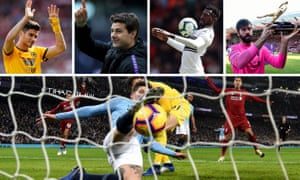English Premier League – Is it Losing Its Midas Touch?
 For several years, the English Premier League was widely acknowledged to be the richest football competition in the world. Not only did they have the greatest television deals in place for greater revenue, but they also have clubs with far reaching brands. These included Manchester United, Arsenal, Chelsea and many more. The Premier League clubs would enjoy high attendances and consistently did well in European competitions. This in turn brought in more revenue from gate receipts and merchandising. The combined financial rewards with broadcast rights led to the clubs attracting better quality players both home and abroad, thus giving them further opportunities to improve both on and off the field. 스포츠티비
For several years, the English Premier League was widely acknowledged to be the richest football competition in the world. Not only did they have the greatest television deals in place for greater revenue, but they also have clubs with far reaching brands. These included Manchester United, Arsenal, Chelsea and many more. The Premier League clubs would enjoy high attendances and consistently did well in European competitions. This in turn brought in more revenue from gate receipts and merchandising. The combined financial rewards with broadcast rights led to the clubs attracting better quality players both home and abroad, thus giving them further opportunities to improve both on and off the field. 스포츠티비
This would appear to go on and on in a neverending cycle of wealth. However, the latest money rankings of European clubs have indicated otherwise. There are now no Premier League teams in the top two richest football clubs in Europe. Instead, previous leaders like Manchester United and Chelsea have fallen short and slid down the rankings. The only improvement was seen from Arsenal and Manchester City, both clubs having benefited in different ways. Now, the top two Spanish football teams of Real Madrid and Barcelona have outstripped their English rivals which have prompted more opinions that English football is again on the decline.
Is it true then that being overtaken on the money list truly points to the demise of wealth and success in English football? Such an accusation would require proper analysis and discussion of the true state of the various Premier League club involved. Are they suffering from a drop in revenue and thus faring worse in other areas as a result of that?
 One would first have to determine the change in ownership of several of these clubs. Teams like Manchester United and Chelsea have gone from being largely British owned in the past to foreign owners or being run like commercial entities. Some of these new owners took over the clubs and used them as debt equity wagons thus causing them to be saddled with debts on the books. It does not reflect a true drop in the revenue streams for the clubs. However, with these debts, many of which require large interest payments for many years, the bottomline of these clubs have thus taken a serious hit. Their revenues might have increased with success, but they are disproportionately less than the large amounts of debt that were transferred to their accounts. This is something that is not necessarily clear on first look with recent money rankings.
One would first have to determine the change in ownership of several of these clubs. Teams like Manchester United and Chelsea have gone from being largely British owned in the past to foreign owners or being run like commercial entities. Some of these new owners took over the clubs and used them as debt equity wagons thus causing them to be saddled with debts on the books. It does not reflect a true drop in the revenue streams for the clubs. However, with these debts, many of which require large interest payments for many years, the bottomline of these clubs have thus taken a serious hit. Their revenues might have increased with success, but they are disproportionately less than the large amounts of debt that were transferred to their accounts. This is something that is not necessarily clear on first look with recent money rankings.
